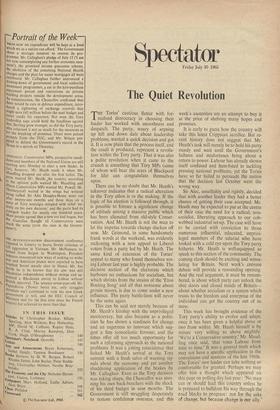-- Portrait of the Week ' PROM NOW ON expenditure will be
kept at a level which we as a nation can afford.' The Government chose a strategic moment to reverse its pro- gramme. Mr. Callaghan's pledge of July 15 CI am not now contemplating any further economic mea- sures'), the promised income guarantee scheme, the abolition of the remaining National Health charges and the plan for easier mortgages all went Overboard. Mr. Callaghan further announced a slowing-down of government and local authority investment programmes, a cut in the hire-purchase repayment period and restrictions on private building projects outside the development areas. As compensation, the Chancellor confirmed that there would be cuts in defence expenditure, intro- duced a tightening of exchange controls that might save £45 million before the next budget and easier credit for exporters. Not even the Tory leadership saga could hold the headlines against that. Sterling grew stronger, so did the Tory party, who criticised it not so much for the measures as for the breaking of promises. There were pained Protests from the TUC, and Mr. Wilson pre- Pared to defend the Government's record in the House in a speech on Thursday.
* °Piricinur, Conservative MPs, prospective candi- dates and members of the National Union are still meeting next Monday to elect a new leader. In fact, however, Mr. Heath made it when Mr. Maudling dropped out after the first ballot. The Press wanted Mr. Heath, the country according to the opinion polls wanted Mr. Maudling and fifteen Conservative MPs wanted Mr. Powell. Mr. Thorneycroft waited in the wings but without being called. Sir Alec Douglas-Home went out after twenty-one months and three days on a
wave of Tory nostalgia mingled with relief 'en- tire!"
y on his own decision,' and the party had its Youngest leader for nearly one hundred years. Most people agreed that a new era had begun, but the Guardian thought all Conservatives were much the same (even the ones in the Govern- ment?).
Trin srvENTEEN-NATION disarmament conference resumed in Geneva to heavy Soviet criticism of US aggression in Vietnam. Mr. McNamara re- turned from Saigon to Washington, President Johnson announced new ways of seeking no wider War and American planes were reported to have bombed Soviet missile sites in Hanoi. Mr. Ian Smith let it be known that his aim was still Rhodesian independence without strings and ap- pointed a Rhodesian envoy to Lisbon without 1!ritish approval. The seventy-seven-year-old Mr. I aPandreou ('Power bores me, only struggles stimulate me') continued to rock the new Greek government at will, and the EEC Council of 34Inisters met for the first time since the French boycott but achieved no more than that.




























 Previous page
Previous page